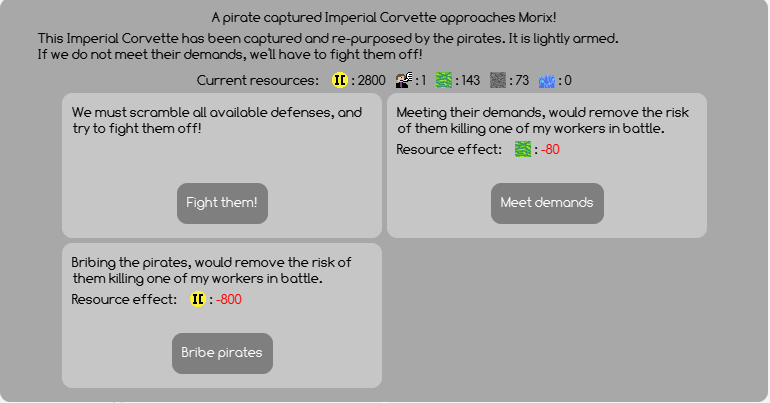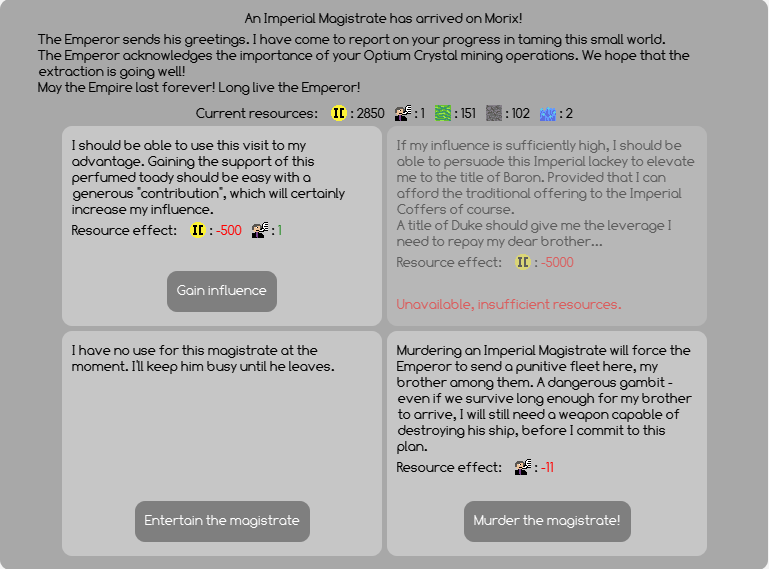Introduction
The following Post Mortem contains my reflections on what went well, and what did not go as planned, during the creation of The Morix Colony, my recent Ludum Dare 38 submission.
Background:
The Morix colony is a turn-based strategy game, in which a young nobleman was banished from the Imperial Court by his older brother. He was sent to the small remote planet of Morix, to act as its new governor. Using the resources of his new world, he will extract raw materials, amass wealth and influence, upgrade the colony, and fight off (and/or bribe) marauding space pirates. Eventually, he will become powerful enough to be able to repay his brother for the injustice.
It was made in my sixth Ludum Dare, and was my first time participating in the Jam instead of the Compo.

What went well:
- Story - I’m glad I took the time to work out a story as my first task, as it gave the player a specific goal to achieve. At the same time, it gave me a contextual framework for all the other writing in the game. This meant that I could frame all the other events, resources and NPCs in terms of how it helped the ambitious main character in achieving his goal.
- Participating in the Jam - I usually participate in the Compo, but this year I decided to participate in the jam instead. I followed the same restrictions as the Compo, but for the extra time. I really enjoyed having time to make some deeper gameplay, a proper story, and a more polished end result this time.
- Content - I am happy with the amount of content I managed to include in the game this LD. I managed to include a variety of gameplay elements and resources interacting with each other. I had time for a greater variation in the writing, and even made two different endings. I also managed to implemented a good deal of reactivity: The NPCs addressing you differently depending on your reputation and social status. The random events changing if you become a criminal (or as a result of various actions through the game). And your advisor has different reaction facial expressions, depending on the news of the round. Just to mention a few.
- Mechanics - I am quite satisfied with the mechanics I implemented. The interplay between the resources, the colonist allocation and the random events worked out pretty well. The gameplay naturally evolves into three different phases: Forst a survival phase in the beginning, where death could come swiftly. Then, this is gradually replaced by gaining traction, as you start to be able to buy upgrades, and are able to take advantage of the positive random events. And then, finally the feeling of power and stability, as you amass wealth and resources in preparation for victory. I also think I hit upon a good number of different resources. They behaved similarly in some respects, but also had unique uses to justify their separate existence.
- UI - I was pretty satisfied with how the UI turned out. It seems that the tooltips in particular, worked well in explaining the game mechanics. I also feel that I struck a good balance between gameplay complexity and a simple interface. I also wanted to have tracked the colony upgrades in the UI, but I did not have the time to make the icons, so that instead became part of the end-of-game score.

Things that didn't go as planned:
- Scope - My scope ended up a bit too large. I had to cut a few features, like extra facilities and upgrades that would have given the player more control over the random events. For instance the ability to assign colonists to defense, or to operate a radio facility, which would allow finer control over the probability of the random events. I’d liked to expand upon the mechanics even further, with a few more facilities, upgrades, and events for variety’s sake.
- Early game - The early game suffered a bit from the cuts mentioned above. In the beginning, before you have built up a stockpile of resources, there is not a lot to do, except for advancing the clock, and hoping for some good random events, to be able to survive the pirate attacks. I had originally planned for an extra “game phase” in the beginning. There you would spend your first turns building up the colony. This would culminate in the construction of a space port, and mark the beginning of getting the “visitor” random events. Instead, I tweaked the pacing of the beginning, so that you have to balance your growth with being able to keep the pirates at bay. But the randomness of this phase felt frustrating to some players.
- Content - While I built a lot of reactivity and details into the game, I think I should have adapted this effort to the kind of event that Ludum Dare is. The time spent on multiple endings, and creating a lot of subtle details that will only be seen after playing for quite a while, could probably have been better spent on improving the early game experience.
- Tool-familiarity - I made the game using Java and LibGDX, which is my usual tool set. But this time, I ended up spending several hours on Saturday, on experimenting with mouse-over, and drag and drop functionality. I should definitely have practiced more on using the UI-toolkit before the event itself.
- No music or sounds - Every LD I want to make some music and sound, but in most of them I fail to allocate the time for it. For sounds, I usually use BFXR, but I think I have to find a simple music tool without a daunting amount of features, much like the simplicity of Aseprite allows me to make functional pixel graphics. If you know of any such music creation tool, I’d appreciate it if you would leave a comment!

Conclusion
This has been one of my most enjoyable Ludum Dare events so far. Due to the extra time from the Jam, I had time to experiment with some deeper mechanics than usual. I was also able to spend more time on the writing and story, and to create a user-interface that feels more “alive” than in my previous games. I’ve also enjoyed the post-LD gaming, I feel that I’ve played some real gems this time!
